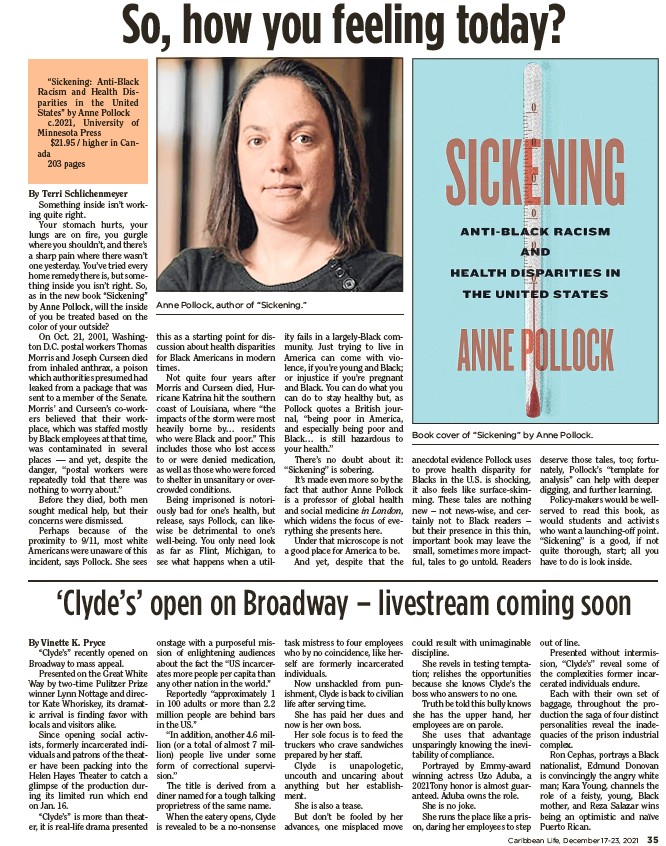
So, how you feeling today?
‘Clyde’s’ open on Broadway – livestream coming soon
Caribbean Life, December 17-23, 2021 35
By Terri Schlichenmeyer
Something inside isn’t working
quite right.
Your stomach hurts, your
lungs are on fire, you gurgle
where you shouldn’t, and there’s
a sharp pain where there wasn’t
one yesterday. You’ve tried every
home remedy there is, but something
inside you isn’t right. So,
as in the new book “Sickening”
by Anne Pollock, will the inside
of you be treated based on the
color of your outside?
On Oct. 21, 2001, Washington
D.C. postal workers Thomas
Morris and Joseph Curseen died
from inhaled anthrax, a poison
which authorities presumed had
leaked from a package that was
sent to a member of the Senate.
Morris’ and Curseen’s co-workers
believed that their workplace,
which was staffed mostly
by Black employees at that time,
was contaminated in several
places — and yet, despite the
danger, “postal workers were
repeatedly told that there was
nothing to worry about.”
Before they died, both men
sought medical help, but their
concerns were dismissed.
Perhaps because of the
proximity to 9/11, most white
Americans were unaware of this
incident, says Pollock. She sees
this as a starting point for discussion
about health disparities
for Black Americans in modern
times.
Not quite four years after
Morris and Curseen died, Hurricane
Katrina hit the southern
coast of Louisiana, where “the
impacts of the storm were most
heavily borne by… residents
who were Black and poor.” This
includes those who lost access
to or were denied medication,
as well as those who were forced
to shelter in unsanitary or overcrowded
conditions.
Being imprisoned is notoriously
bad for one’s health, but
release, says Pollock, can likewise
be detrimental to one’s
well-being. You only need look
as far as Flint, Michigan, to
see what happens when a utility
fails in a largely-Black community.
Just trying to live in
America can come with violence,
if you’re young and Black;
or injustice if you’re pregnant
and Black. You can do what you
can do to stay healthy but, as
Pollock quotes a British journal,
“being poor in America,
and especially being poor and
Black… is still hazardous to
your health.”
There’s no doubt about it:
“Sickening” is sobering.
It’s made even more so by the
fact that author Anne Pollock
is a professor of global health
and social medicine in London,
which widens the focus of everything
she presents here.
Under that microscope is not
a good place for America to be.
And yet, despite that the
anecdotal evidence Pollock uses
to prove health disparity for
Blacks in the U.S. is shocking,
it also feels like surface-skimming.
These tales are nothing
new – not news-wise, and certainly
not to Black readers –
but their presence in this thin,
important book may leave the
small, sometimes more impactful,
tales to go untold. Readers
deserve those tales, too; fortunately,
Pollock’s “template for
analysis” can help with deeper
digging, and further learning.
Policy-makers would be wellserved
to read this book, as
would students and activists
who want a launching-off point.
“Sickening” is a good, if not
quite thorough, start; all you
have to do is look inside.
“Sickening: Anti-Black
Racism and Health Disparities
in the United
States” by Anne Pollock
c.2021, University of
Minnesota Press
$21.95 / higher in Canada
203 pages
Anne Pollock, author of “Sickening.”
Book cover of “Sickening” by Anne Pollock.
By Vinette K. Pryce
“Clyde’s” recently opened on
Broadway to mass appeal.
Presented on the Great White
Way by two-time Pulitzer Prize
winner Lynn Nottage and director
Kate Whoriskey, its dramatic
arrival is finding favor with
locals and visitors alike.
Since opening social activists,
formerly incarcerated individuals
and patrons of the theater
have been packing into the
Helen Hayes Theater to catch a
glimpse of the production during
its limited run which end
on Jan. 16.
“Clyde’s” is more than theater,
it is real-life drama presented
onstage with a purposeful mission
of enlightening audiences
about the fact the “US incarcerates
more people per capita than
any other nation in the world.”
Reportedly “approximately 1
in 100 adults or more than 2.2
million people are behind bars
in the US.”
“In addition, another 4.6 million
(or a total of almost 7 million)
people live under some
form of correctional supervision.”
The title is derived from a
diner named for a tough talking
proprietress of the same name.
When the eatery opens, Clyde
is revealed to be a no-nonsense
task mistress to four employees
who by no coincidence, like herself
are formerly incarcerated
individuals.
Now unshackled from punishment,
Clyde is back to civilian
life after serving time.
She has paid her dues and
now is her own boss.
Her sole focus is to feed the
truckers who crave sandwiches
prepared by her staff.
Clyde is unapologetic,
uncouth and uncaring about
anything but her establishment.
She is also a tease.
But don’t be fooled by her
advances, one misplaced move
could result with unimaginable
discipline.
She revels in testing temptation;
relishes the opportunities
because she knows Clyde’s the
boss who answers to no one.
Truth be told this bully knows
she has the upper hand, her
employees are on parole.
She uses that advantage
unsparingly knowing the inevitability
of compliance.
Portrayed by Emmy-award
winning actress Uzo Aduba, a
2021Tony honor is almost guaranteed.
Aduba owns the role.
She is no joke.
She runs the place like a prison,
daring her employees to step
out of line.
Presented without intermission,
“Clyde’s” reveal some of
the complexities former incarcerated
individuals endure.
Each with their own set of
baggage, throughout the production
the saga of four distinct
personalities reveal the inadequacies
of the prison industrial
complex.
Ron Cephas, portrays a Black
nationalist, Edmund Donovan
is convincingly the angry white
man; Kara Young, channels the
role of a feisty, young, Black
mother, and Reza Salazar wins
being an optimistic and naïve
Puerto Rican.